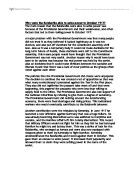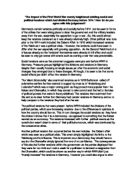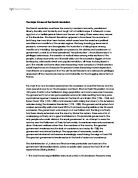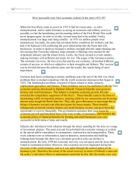What was the most important reason that Stalin rose to power?
What was the most important reason that Stalin rose to power? By 1927 Stalin had gained full political power in Russia. One reason why he was able to come to power is when Trotsky failed to attend Lenin's funeral in 1924. This is because when Trotsky didn't turn up it made Stalin look as though he cared for Lenin instead of Trotsky. Lenin was popular with many people and they were sad that he was now dead. Stalin was able to take advantage of this and tell everyone what a great man Lenin was. If he got support because he looked as though he cared he would become more popular. Trotsky, on the other hand, looked as though he didn't care because he was not able to get to the funeral. Later he claimed that Stalin had told him that the funeral was on a different date. But this didn't affect Stalin's status because nobody knew that he had done it. The fact that Stalin helped carry the coffin and that he made the main speech is ironic because the year before in 1923, Lenin had written a Testament, clarifying his view about every Member of Parliament. In this, Lenin wrote that Stalin had already got too much power and that he was not trust worthy, "I am not sure that he will always know how to use that power with sufficient caution". The link between these two events is important because if anybody had seen the Testament before the funeral they would have thought differently about
What were the causes of World War II?
History Coursework; Edexcel. What were the causes of World War II? Many historians have traced the causes of World War II to problems left unsolved by World War I (1914-1918). World War I and the treaties that ended it also created new political and economic problems. Forceful leaders in several countries took advantage of these problems to seize power. The desire of dictators in Germany, Italy, and Japan to conquer additional territory brought them into conflict with the democratic nations. After World War I ended, representatives of the victorious nations met in Paris in 1919 to draw up peace treaties for the defeated countries. These treaties, known as the Peace of Paris, followed a long and bitter war. They were worked out in haste by these countries with opposing goals; and failed to satisfy even the victors. Of all the countries on the winning side, Italy and Japan left the peace conference most dissatisfied. Italy gained less territory than it felt it deserved and vowed to take action on its own. Japan gained control of German territories in the Pacific and thereby launched a program of expansion. But Japan was angered by the peacemakers' failure to endorse the principle of the equality of all races. The countries that lost World War I--Germany, Austria, Hungary, Bulgaria, and Turkey--were especially dissatisfied with the Peace of Paris. They were stripped of
The Significance of Lenin in the Bolshevik Revolution (1917-1923)
GCSE HISTORY COURSEWORK: Russia Assignment 1: The Significance of Lenin in the Bolshevik Revolution (1917-1923) Ellen Taylor 11E, - Mr Sharpe CONTENTS PAGE: a) Explain Lenin's contribution to the development of the Bolshevik Party up to and including April 1917. b) Explain why Lenin and the Bolsheviks replaced the Provisional Government as leaders of Russia by November 1917. c) The following were equally important reasons why Lenin and the Bolsheviks were able to hold onto power during the Civil War: * Trotsky's organisation of the Red Army * The disunity of the White opposition * War Communism * The leadership qualities of Lenin Explain how far you agree with this statement. Bibliography a) Explain Lenin's contribution to the development of the Bolshevik Party up to and including April 1917. Every successful political party needs a compelling leader, an inspiration, and an originator of ideas. Lenin was a vital source of all these qualities and more for the Russian Bolshevik Party. It was in 1903 that he made his first mark as a leader. At the second Congress of the Social Democratic Party he presented his plan for a revolution and insisted that the Congress agreed to every new and innovative element of it. Lenin was determined to get his own way. He proposed a new form of party, a professional revolutionary organization that would seize power for
To what extent was the failure of the Socialist movement responsible for bringing Mussolini to power?
To what extent was the failure of the Socialist movement responsible for bringing Mussolini to power? In 1919, Fascism was first set up as a small movement amongst many, but it expanded fast, especially after Mussolini changed his policies from the left to the right and by 1922 he was prime minister. Fascism was seen as an alternative to the popular Socialists, and many people simply supported Fascism to stop the Socialists getting into power. However, just being a rival to Socialism would not be enough to gain power, thus the Fascists attacked the Socialists and together with the many weaknesses of the Socialists, it caused the Socialists to lose a lot of popularity and help the Fascists. This decline of the Socialists was one cause of many which put the Fascists into power. This failure was to a great extent, responsible for bringing Mussolini into power. This was because the Fascists used violence against the Socialists to make it seem as if they were "saving" the people from them, and the failure of Socialism at the same time helped the Fascists continue their violence without much resistance. The Socialist movement had many weaknesses by 1921. Many of these happened internally and helped Mussolini take power. Firstly, it did not have a strong enough leader. In fact, one of these potential leaders could have been Mussolini but he was banished. Therefore, the PSI was left
Was Hitler a weak dictator?
Was Hitler a weak dictator? The Third Reich, for Hitler, was supposed to have lasted 1000 years minimum, but it only lasted 12 years and four months. Many historians blame this on an individual that's Hitler himself. The argument is based on Hitler being actually a weak dictator that wasn't able to unite Germany as a new Fuhrer should had, also he didn't create the basis of a strong empire but hurried everything up putting on risk everything he had accomplished. As Germany 1918 to 1945 states 'The inconsistency and contradiction in Nazi Government arose entirely from the Fuhrer's weaknesses'. When Hitler establishes his control over Germany in 1933, his power was by no means absolute as Stephen Lee states. For example he never had emergency powers from Hindenburg's, this still gave the Weimar Republic a chance to control him. However, Hitler used the Weimar State's own political element, democracy, to destroy it. He strengthened the influence of the NSDPA to later put as many seats in the Reichstag as possible, he controlled meetings of other parties, and passed several laws (he had vast majority in the parliament) to grant him absolute powers over Germany. Nazi Germany definitely didn't have a head that controlled, ordered and imposed every action to be taken in the German territorylike Italy or Russia had. As an article published by the University of Wales states, 'it
Victor Hugo
For my PowerPoint presentation, I chose to do it on Victor Hugo. Victor Hugo was a French poet, playwright, novelist, essayist, visual artist, diplomat, human rights campaigner, and one of the greatest writers of all time. His best-known works are the novels Les Misérables and Notre-Dame de Paris. Victor-Marie Hugo was born on February 26, 1802 in Besançon, France. He was the third and last son of Joseph Léopold Sigisbert Hugo and Sophie Trébuchet. His brothers were Abel Joseph Hugo and Eugène Hugo. After his parent's separation, he lived with his mother in Paris. He attended the Lycée Louis-le Grand there. During this time, he developed a passion for writing. This passion would remain with him throughout the rest of his life. Victor Hugo fell in love with his childhood friend Adèle Foucher. The two became secretly engaged because Victor's mother disapproved Adèle. After his mother's death, Hugo felt his was free to marry whomever he wanted to marry. The two married in 1822. They had their first child Léopold in 1823, but the child in infancy. The couple had four other children. Léopoldine was born on August 28, 1842; Charles was born on November 4, 1826; François- Victor was born on October 28, 1828; and Adèle was born on August 24, 1830. Most of the writers of Victor Hugo's generation were experimenting with the literary movement of Romanticism.
Vietnam war
* Total U.S. bomb tonnage dropped during: World War II = 2 057 244 tons Vietnam War = 7 078 032 tons (3.44 times as much as WWII) * Bomb tonnage dropped during the Vietnam War amounted to 000 lbs. for every man, woman and child in Vietnam. * An estimated 70 000 draft evaders and "dodgers" were living in Canada by 1972. * A Cornell University study placed the over-all total U.S. cost of the Vietnam war at $200 Billion * 30 April 1969 - Peak US troop strength 543 000 * Approximately 12,000 helicopters saw action in Vietnam * 9,087,000 military personnel served on active duty during the Vietnam era (August 5, 1964 - May 7, 1975). * 8,744,000 GIs were on active duty during the war (August 5, 1964 - March 28, 1973). * Married men killed: 17,539. * 61% of the men killed were 21 or younger. * Hostile (VC, NVA) deaths: 47,359. * Non-hostile (US, ARVN) deaths: 10,797. * POWs: 766 (114 died in captivity). * Total draftees (1965-73): 1,728,344. * Draftees accounted for 30.4% (17,725) of combat deaths in Vietnam. * Twenty-five (25) percent of the total United States forces serving in Vietnam were draftees * 76% of the men sent to Vietnam were from lower middle/ working class backgrounds * 82% of veterans who saw heavy combat strongly believe the war was lost because of lack of political will * (1993) Nearly 75% of the public agrees it was a failure of political
Why were the Bolsheviks able to seize power in October 1917?
Why were the Bolsheviks able to seize power in October 1917? In this essay I will be finding out why the Bolsheviks were able to take power in October 1917. The main body will consist of three parts. Firstly, the reasons why the Provisional Government in Russia had lost support due to the problems in Russia that were not handled by them. Secondly, the reasons why the Bolsheviks had gained power because of the growing support in different social classes and events that took place that made people favour the Bolsheviks. Thirdly, the role of Lenin in the Bolshevik party and how did he make the party emerge as one of the least favoured party of the country, to the ruling party. As the majority of the population was the peasantry, Provisional Government supporters were a minority because of its bourgeois members and issues that were ignored, such as the land issue, as the revolution occurred peasants expected their own piece of land. The Provisional Government was not elected which as all its members knew and because of this there was a lack of authority. Russians knew it would be replaced after elections and the delay in spring 1917 was an attempt to hang on to power. The Petrograd Soviet was a respected representation of the Russian people that was mostly run by Mensheviks and Social Revolutionaries (SR's). Most importantly the existence of the Petrograd Soviet had lowered
Why were the Bolsheviks able to seize power in October 1917?
Why were the Bolsheviks able to seize power in October 1917? The main reason that the Bolsheviks were able to seize power was because of the Provisional Government and their weaknesses, and other factors that led to them taking power in October 1917. A major problem with the Provisional Government was that many people did not trust it as they believed it lacked legitimacy as it was not elected, and also put off elections for the constituent assembly until late. Also as it was a temporary body it could not make decisions for the long-term future of Russia, these decisions were left to the Constituent Assembly, this means people would have thought that the Provisional Government was not very useful. Another reason why it would have been seen to be useless was because the real power was held by the soviet. Also on decisions that it could make divisions between the socialist and liberals meant that there was a lack of clear policies as the groups often voted against each other. The policies that the Provisional Government did create were unpopular. The decision to continue the war created a lot of opposition as that was what many revolutionary's protested against the Tsar in the first place. They also did not legitimise the peasant take-overs of land that were happening, this angered the peasants who were less than willing to supply food to the cities. The Provisional
Why were the major cities of Britain bombed by Germans in 1940-41?
Course work question one Why were the major cities of Britain bombed by Germans in 1940-41? The blitz is the German name we use to name the nighttime bombing of London and other major cities. Hitler turned to terror bombing of London and the other cities such as ports and high industrial areas because the R.A.F had previously attacked Berlin. Hitler wanted revenge for this so he sent the Luftwaffe to counter attack. This resulted with most of the Luftwaffe being destroyed. Hitler then only sent the Luftwaffe to plummet London at night with bombs. Before the blitz and other bombing raids in cities all over the world there were three steps to this, Dunkirk and the so called operation sea lion which never happened but lead to the battle of Britain. Dunkirk was the major defeat for Britain, which through propaganda was turned into a victory. But the facts proved what actually happened. Then Hitler had a problem. He was going to attack Russia and then there would be too many fronts to fight on. This called for a truce. Hitler offered peace to Churchill. But as stubborn as ever Churchill refused and decided to carry on battling with the so-called British or blitz spirit. This annoyed Hitler gravely and he thought up of the operation sea lion. This could only go into action if the German navy weren't going to be attacked by the only line of defence Britain had at the moment. The



























